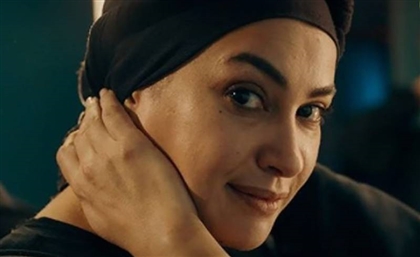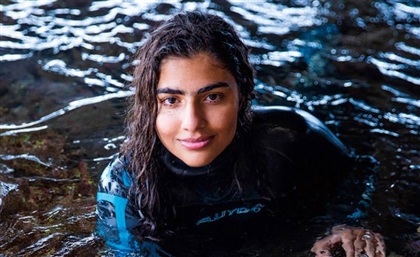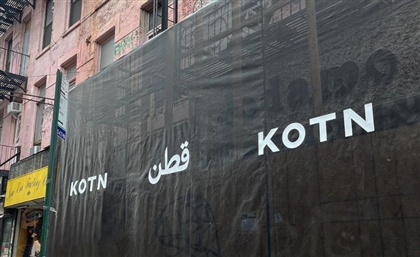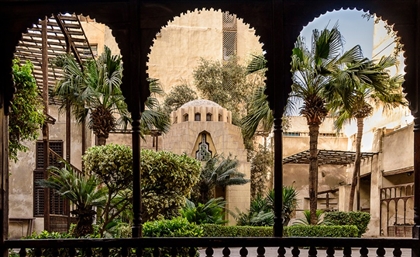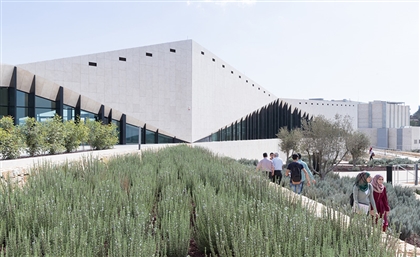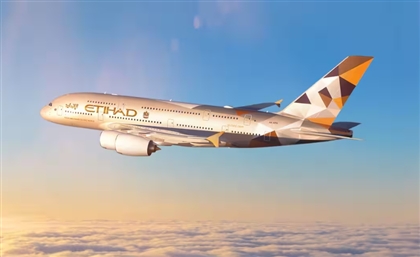Khalid Abdalla: The Narrow Frame of Midnight
In a movie review and actor spotlight combo, our Staff Writer Seif Bibars headed out to watch the Panorama screening of Itar El-Layl, and had a sit down with the films lead actor Khalid Abdalla.
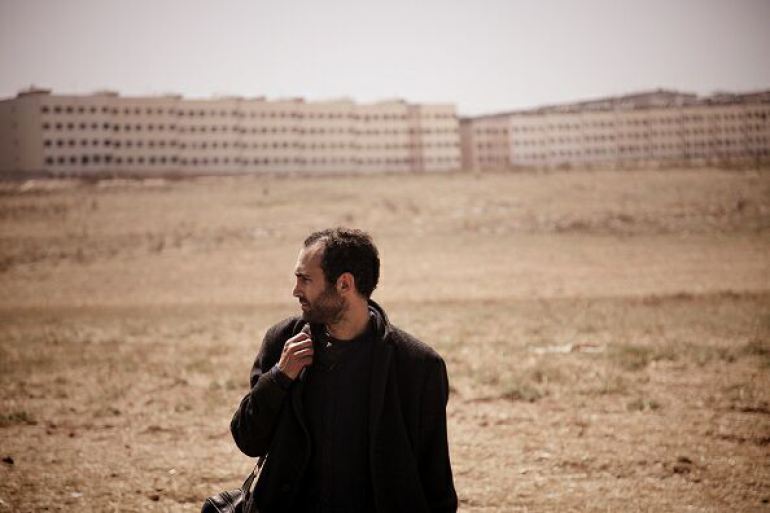
As part of CairoScene's coverage of the 8th Panorama of European Film, I got to review Itar El-Layl (The Narrow Frame of Midnight), and had a chance to sit down with lead actor Khalid Abdalla for a one-on-one. Itar El-Layl is a Moroccan/French/English production, directed and written by Tala Hadid. A story of two orphans who met each other by chance. Khalid Abdalla playing the role of Zaccaria, whose brother goes missing in jihadi territory and decides to go looking for him. He meets Abbas, a human trafficker played by Hocine Choutri, who - along with his girlfriend, played by Majdouline Idrissi - just bought a young orphan girl named Aischa, played by Fadwa Boujouane, with plans to sell her to a french pedophile. When Zaccaria learns Abbas' intentions for Aischa - an orphan like him - he decides to help her and takes her to his ex girlfriend Judithe, played by Marie-Josee Croze, who lives on a secluded farm house. He leaves Aischa and continues to search for his brother Youcef, who doesn't appear in the movie. His search takes him to Iraq; he makes it there through Turkey, literally walking across the border.
The first scene of the film opens with Khalid getting out of a car, arriving at what was a neighbourhood of residential flat blocks, reminiscent of post-communist Soviet Union. The rest of the shots that were captured in Morocco showed some of the colonial architecture in Casablanca, and many different areas of the Moroccan country side, some of which were really picturesque almost as if you're starring into a painting. Turkey and Iraq appeared briefly, and very bleak in comparison to some of the scenes in Morocco. All three countries were, in my opinion, treated as characters in their own right. The art director's choice of costumes was fitting to each of the characters' personalities, speaking about their situations and their lifestyles.
The film contained little dialogue; Abdalla only had ten lines in the whole film, but he managed to communicate proficiently through facial expressions and body language. In one scene, the actor says that he had no idea that the camera was on him, citing that he had "prepared intensely for 4 years". The film required only 188 cuts with only four to five ever being repeated; impressive considering that most feature films of this length require anything from 1000 up to 3000 cuts. Making such a film "required heavy preparation", said Abdalla, adding that "Playing Zaccaria changed me, it opened different areas of perception. I consider Zaccaria to be a brother to me; I had to learn Moroccan just to play him".
All the actors gave a stellar performance, one of which is Fadwa Boujouane's Aischa. Boujouane wasn't in the original cast, but was cast for the role after the original girl that was set to play Aischa changed her mind about acting only two weeks before shooting started. Abdalla explained, "Faced with a big chance of having to stop, Tala was going crazy. Then while she was walking in the street, she saw Fadwa, playing with her friends. Hadid approached her and asked her if she could take her to her parents who agreed on her acting." He continues, "the filming of the whole movie and the way it was put together and how it came out is nothing short of a miracle." Boujouane's depiction of Aischa was so good that it is hard to believe that she never had any experience as an actress before. The role is not easy, and for a young girl who never acted before I'm sure it was daunting. Abdalla mentions that Aischa comes from a very poor family who live in random housing, and that she lived a very difficult and harsh life, but she had an amazing soul. Abdalla says that Boujouane and Tala became inseparable since shooting began, and are still very close to this day. Abdalla described that "a big part of her performance is that she regarded Tala as her mother, she loved her very much."
In some scenes the lighting didn't make much sense; it didn't look like it was natural but it wasn't something you would notice unless you were paying attention to details. Despite being nominated for the Annonay International Festival of First Films' Grand Jury Prize, and the Dubai International Film Festival's Muhr Award for Best Fiction Feature - two very prominent awards, and being screened in several international film festivals, the film hasn't won any awards yet. Overall, the movie got 5.4 out of 10 average user ratings online. A deep rooted understanding of Middle Eastern culture in my opinion is required for the movie's full message to be revealed. I asked Abdalla about what message the movie intended to deliver, he explained that "The movie didn't have an intended message per se, but it was trying to display an issue, several issues actually." He elaborates, "Tala is half Moroccan half Iraqi, was raised in France and studied in the United States. She was in the States on 9/11 and started writing the script during 2003. We started filming in 2013. It was a result of what happened around us - the war, the revolution - it sends a message indirectly. I also think that because she is Iraqi, she tried to show respect to the victims and those still to come".
Abdalla's performance was without exaggeration unlike anything I have ever seen before. My curiosity drove me to ask him what kind of training he received, his answer surprised me. He said, "I never received any formal training, although I did act in Cambridge where I studied literature and where I also formed a theatre company. Originally I got into acting when Philip Swan, a teacher in my school, took my school's theatre production to the Edinburgh Festival". His school was performing a remake of Someone Who'll Watch Over Me by Frank McGuinness, directed by Abdalla, and ended up having a successful run at the Edinburgh Festival. He also mentioned that he spent a year in Paris with Philippe Gaulier, a French Master Clown, who also mentored notables like Sacha Baron Cohen, Emma Thomson, and Oscar winner Roberto Benigni.
I was immersed in what I believe is going to be our next Omar El Sherif. Abdalla has already taken part in several Hollywood pictures, like Director Marc Foster's, The Kite Runner, Director Paul Greengrass' Green Zone starring Matt Damon, and earlier on, in 2006, played a role in United 93, his first film with Paul Greengrass which went on to receive an Oscar. The man appeared in many other roles; he has acted in several languages, including, Afghan Dari, Moroccan, French, Spanish, Iraqi, Lebanese, and different English accents. He said that he needs a minimum of six weeks to learn a new language, or at least the parts that the role demands.
Abdalla has lived in many places around the world, including New York, London, Glasgow, Paris, Cairo, even Kabul for a while prior to filming The Kite Runner where, as he said, "I got to learn how to speak Afghani and fly kites". He mentioned that Cairo and London both had the greatest impact on him as an actor. Abdalla has been situated in Cairo since 2008, where he and his wife Cressida Trew -an established Actor and Filmmaker- are both are pursuing their careers in film. They started the Mosreen archives during the revolution, which went on to be the most watched channel on YouTube during January 2011, becoming the most viewed channel in the world. He appeared in a movie his wife was working on, The Square, a movie about the revolution in Egypt that was nominated for four Emmys, of which it won three, it was also nominated for an Oscar at the 86th Academy Awards.
To conclude our meeting I asked about his plans and what he wants to contribute towards in the future. "I usually don't make plans, but I do want to take part in movies where I get to speak like I speak in real life" explains Abdalla, who was born in Glasgow, Scotland and speaks English with a British/Scottish accent, and Arabic in an Egyptian accent. He added that "What I really see as a problem is our image as Arabs to the rest of the world. This image has been deeply embedded in the global scene and is influencing how moviemakers around the world are portraying us, and thats ok. I see that everyone has the right to make a a movie about a country or region that is not his own; but since none of us are making anything to influence our image to the rest of the world, we will always be depicted like this. This can only be changed by cinema made here by us. If anything, I hope to contribute to that".
- Previous Article Dr.Sisilove or How (Not) To Diffuse A Bomb
- Next Article 100 Best Graphic Design Posters Exhibition
Trending This Week
-
Apr 23, 2024
-
Apr 18, 2024




